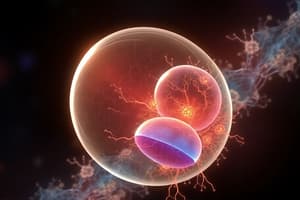Podcast
Questions and Answers
What is the primary focus of embryology as defined in the content?
What is the primary focus of embryology as defined in the content?
- The study of the development of tissues (correct)
- The study of disease in the oral cavity
- The study of oral hygiene practices
- The study of surgical procedures on the head
Which of the following is NOT a topic covered in the embryology sessions outlined?
Which of the following is NOT a topic covered in the embryology sessions outlined?
- Embryology of the crown
- Embryology of eruption and exfoliation
- Embryology of the root
- Embryology of connective tissues (correct)
What type of assessment is indicated as counting towards the final grade in the embryology module?
What type of assessment is indicated as counting towards the final grade in the embryology module?
- Workbooks
- Group work sessions
- E-assessment for Biomedical Sciences module (correct)
- Discussions
What should students be able to explain by the end of the embryology sessions?
What should students be able to explain by the end of the embryology sessions?
In the context of embryology, what are the 'embryonic origins' referring to?
In the context of embryology, what are the 'embryonic origins' referring to?
What are the three primary layers involved in embryonic development?
What are the three primary layers involved in embryonic development?
During which weeks of embryonic development do the key stages of neuroectoderm and neural crest cell formation occur?
During which weeks of embryonic development do the key stages of neuroectoderm and neural crest cell formation occur?
Which structure is derived from neural crest cells?
Which structure is derived from neural crest cells?
Which of the following is NOT a derivative of the ectoderm?
Which of the following is NOT a derivative of the ectoderm?
What is the purpose of neural crest cells during embryogenesis?
What is the purpose of neural crest cells during embryogenesis?
What is one of the clinical significances of embryogenesis in terms of developmental anomalies?
What is one of the clinical significances of embryogenesis in terms of developmental anomalies?
Which structures are primarily developed during the process of embryogenesis related to facial development?
Which structures are primarily developed during the process of embryogenesis related to facial development?
What is emphasized in the study of embryogenesis that contributes to facial formation?
What is emphasized in the study of embryogenesis that contributes to facial formation?
Which resource is mentioned as a method for understanding oral embryology content?
Which resource is mentioned as a method for understanding oral embryology content?
In the context of embryonic development, what is crucial for fitting the facial structures together?
In the context of embryonic development, what is crucial for fitting the facial structures together?
What is the primary purpose of embryogenesis?
What is the primary purpose of embryogenesis?
Which of the following is NOT one of the three embryonic tissue layers?
Which of the following is NOT one of the three embryonic tissue layers?
During which weeks does the early phase of embryogenesis primarily occur?
During which weeks does the early phase of embryogenesis primarily occur?
What structure is formed by a cluster of cells within the blastocoel during early embryogenesis?
What structure is formed by a cluster of cells within the blastocoel during early embryogenesis?
Which key process involves the division of the zygote into multiple cells?
Which key process involves the division of the zygote into multiple cells?
What is the main focus of fetal development during the period from week 9 until term?
What is the main focus of fetal development during the period from week 9 until term?
What is the most common type of facial cleft in the UK?
What is the most common type of facial cleft in the UK?
Which structure in early embryogenesis serves as the initial fluid-filled space?
Which structure in early embryogenesis serves as the initial fluid-filled space?
What primary factor is indicated as a possible aetiology for congenital anomalies?
What primary factor is indicated as a possible aetiology for congenital anomalies?
Which cellular structure lines the cavity of the blastocyst?
Which cellular structure lines the cavity of the blastocyst?
What could be a potential consequence for patients with untreated cleft lip and palate?
What could be a potential consequence for patients with untreated cleft lip and palate?
What is the primary outcome of the differentiation process during embryogenesis?
What is the primary outcome of the differentiation process during embryogenesis?
What important features develop during embryogenesis weeks 5-8?
What important features develop during embryogenesis weeks 5-8?
Cleft lip results from a failure of fusion of which structures?
Cleft lip results from a failure of fusion of which structures?
Which treatment approach can reduce the impact of cleft lip and palate for patients?
Which treatment approach can reduce the impact of cleft lip and palate for patients?
What is a potential risk for patients with cleft lip and palate regarding dental health?
What is a potential risk for patients with cleft lip and palate regarding dental health?
Which structures fuse to form the primary palate?
Which structures fuse to form the primary palate?
What is one of the phases involved in embryonic development related to orofacial anomalies?
What is one of the phases involved in embryonic development related to orofacial anomalies?
During which weeks does the secondary palate develop?
During which weeks does the secondary palate develop?
What contributes to the congenital aspect of cleft lip and palate?
What contributes to the congenital aspect of cleft lip and palate?
What is the role of the developing tongue in the formation of the secondary palate?
What is the role of the developing tongue in the formation of the secondary palate?
Which part of the tongue develops from the first pharyngeal arch?
Which part of the tongue develops from the first pharyngeal arch?
What forms the incisive foramen?
What forms the incisive foramen?
Which structures contribute to the posterior 1/3 of the tongue?
Which structures contribute to the posterior 1/3 of the tongue?
What is the function of the maxillary prominences during facial development?
What is the function of the maxillary prominences during facial development?
When do the facial prominences begin to fuse to form the face?
When do the facial prominences begin to fuse to form the face?
Flashcards
Embryology definition
Embryology definition
The study of how tissues develop.
Oral cavity development
Oral cavity development
Study of how oral tissues form during development.
Key phases of embryogenesis
Key phases of embryogenesis
The stages in how body structures form.
Embryonic origins of head,face, oral
Embryonic origins of head,face, oral
Signup and view all the flashcards
Developmental interruptions
Developmental interruptions
Signup and view all the flashcards
Ectoderm
Ectoderm
Signup and view all the flashcards
Endoderm
Endoderm
Signup and view all the flashcards
Mesoderm
Mesoderm
Signup and view all the flashcards
Neural Crest Cells
Neural Crest Cells
Signup and view all the flashcards
Somites
Somites
Signup and view all the flashcards
Embryogenesis
Embryogenesis
Signup and view all the flashcards
Embryonic Origins
Embryonic Origins
Signup and view all the flashcards
Derivatives
Derivatives
Signup and view all the flashcards
Blastocyst
Blastocyst
Signup and view all the flashcards
Trophoblast
Trophoblast
Signup and view all the flashcards
Embryoblast
Embryoblast
Signup and view all the flashcards
Early Embryogenesis: Week 1
Early Embryogenesis: Week 1
Signup and view all the flashcards
Early Embryogenesis: Weeks 2-3
Early Embryogenesis: Weeks 2-3
Signup and view all the flashcards
Bilaminar Embryonic Disc
Bilaminar Embryonic Disc
Signup and view all the flashcards
Epiblast
Epiblast
Signup and view all the flashcards
Pharyngeal Arches
Pharyngeal Arches
Signup and view all the flashcards
Facial Prominences
Facial Prominences
Signup and view all the flashcards
Cleft Lip & Palate
Cleft Lip & Palate
Signup and view all the flashcards
Oral Embryology
Oral Embryology
Signup and view all the flashcards
Face Development: Prominences
Face Development: Prominences
Signup and view all the flashcards
Primary Palate Formation
Primary Palate Formation
Signup and view all the flashcards
Secondary Palate Formation
Secondary Palate Formation
Signup and view all the flashcards
Tongue Development: Arches & Swellings
Tongue Development: Arches & Swellings
Signup and view all the flashcards
What is the role of the tongue in secondary palate development?
What is the role of the tongue in secondary palate development?
Signup and view all the flashcards
Incisive Foramen
Incisive Foramen
Signup and view all the flashcards
Lateral Lingual Swellings
Lateral Lingual Swellings
Signup and view all the flashcards
What is an anomaly?
What is an anomaly?
Signup and view all the flashcards
What causes congenital anomalies?
What causes congenital anomalies?
Signup and view all the flashcards
What are the key phases of embryogenesis?
What are the key phases of embryogenesis?
Signup and view all the flashcards
Early embryogenesis
Early embryogenesis
Signup and view all the flashcards
How is cleft lip and palate managed?
How is cleft lip and palate managed?
Signup and view all the flashcards
Study Notes
Embryology of the Head, Face, and Oral Cavity
- Module: Biomedical Sciences
- Year: 1
- Tutor: Lauren Stockham
- Sessions Outline:
- Session 1: Embryology of the head, face, and oral cavity (self-directed workbook)
- Session 2: Embryology of oral tissues (self-directed workbook)
- Session 3: Embryology of the crown (self-directed workbook)
- Session 4: Embryology of the root (self-directed workbook)
- Session 5: Embryology of eruption and exfoliation (self-directed workbook)
- Session 6: Oral embryology consolidation session (live group work + quiz)
Assessment
- Formative:
- Workbooks
- Consolidation session discussions
- Quiz
- Summative:
- E-assessment for Biomedical Sciences module
Intended Learning Outcomes
- Outline the key phases of embryogenesis and development of head, face, and oral cavity structures
- Define embryonic origins (cellular layers) of head, face, and oral cavity structures
- Explain the consequences of developmental interruptions on facial and oral structures
Definitions
- Embryology: The study of tissue development
- Oral Embryology: The study of oral tissue development
- Embryogenesis: The process of embryological development, tissue and organ formation
- Embryonic Origins: The three tissue layers (ectoderm, mesoderm, and endoderm) of the tri-laminar embryonic disc, which give rise to all tissues in the human body
- Derivatives: The structures that the origins/tissue layers form
Key Phases of Embryogenesis and Development
- Fertilisation, cleavage, proliferation, migration and differentiation are the three key phases of embryogenesis and development
- Early Embryogenesis (Week 1-4): Blastocyst formation, three embryonic origins, neural crest cells, pharyngeal arches
- Embryogenesis (Week 5-8): Development of face, palate, tongue, alveolar bone, skull development
- Fetal Development (Week 9-birth): Growth and maturation of fetus
Early Embryogenesis: Week 1
- Embryoblast: a cluster of cells inside the cavity
- Trophoblast: cells lining the cavity
- Blastocoel: primary yolk sac, fluid-filled space
- Blastocyst: (70-100 cells)
- Zygote, 2-cell, 4-cell, 8-cell, Morula (16-cell): stages preceding blastocyst
Early Embryogenesis: Weeks 2-3
- Bilaminar embryonic disc: Ectoderm, Endoderm
- Trilaminar embryonic disc: Bilaminar to Trilaminar, Mesoderm
- Embryonic Origins: These layers form all tissues and organs
Early Embryogenesis: Week 4
- Embryo Shape Changes: folds and arches development
- Stomodeum (Primitive Mouth): forms during the early embryo
- Buccopharyngeal Membrane: Membrane that ruptures to allow communication between the stomodeum and gut
Pharyngeal Arches (Branchial Arches)
- Building Blocks: These arches form the structures of the face and oral cavity.
- Individual Features: Each arch has its own nerve supply, blood supply, and cartilage.
Pharyngeal Arches and Derivatives
- Each arch forms specific parts of the face and oral cavity including bones, muscles, and nerves
- The first arch (1st) forms the mandible, maxilla, zygomatic bones, and ossicles of the middle ear
Development of the primary palate: Week 6-7
- The palate forms in two parts
- The frontonasal prominence and the medial nasal and maxillary prominences fuse together to form the primary palate
- The developing tongue creates space for the secondary palate formation
Development of the secondary palate: Week 7-8
- Palatine shelves develop and grow around the tongue
- Palatine shelves fuse along the midline with the primary palate and nasal septum as the tongue retracts
Development of the tongue: Week 4-7
- Forms from 1st, 2nd, and 4th pharyngeal arches
- Anterior 2/3 from lateral lingual swellings and tuberculum impar
- Posterior 1/3 from the copula/hypobranchial eminence
Development of the alveolar bone: Week 7
- The maxilla and mandible undergo ossification
- Neural and alveolar portions develop to support the development of teeth
- Secondary cartilages support the growth of the bone
Development of the skull
- Cranial vault(brain case)
- Cranial base
- Facial bones
- The bones derive from neural crest cells and mesoderm.
- Cranial vault bones fully fuse by ages 6-7 to allow for brain growth and development
Fetal Development: Week 9-Birth
- Primarily focuses on fetal growth and maturation of formed structures
Clinical Significance
- Developmental anomalies and defects
- Genetic and Environmental causes
- Example of cleft lip and palate
Cleft Lip and Palate
- Definition: Facial clefts (space/gap), congenital anomalies affecting the face and oral cavity. Complete or incomplete, unilateral or bilateral.
- Epidemiology: Cleft lip and palate is a common type of facial cleft disorder (1 in 700 live births) and has significant impact on feeding, speech, and hearing.
- Types of cleft: Cleft lip (CL), Cleft Palate (CP), and Cleft Lip and Palate (CLP).
- Management: Diagnosis and treatment are effective. Multidisciplinary teams treat patients young, and patients may still have a higher risk of oral health problems, requiring further orthodontic or restorative procedures
Studying That Suits You
Use AI to generate personalized quizzes and flashcards to suit your learning preferences.




